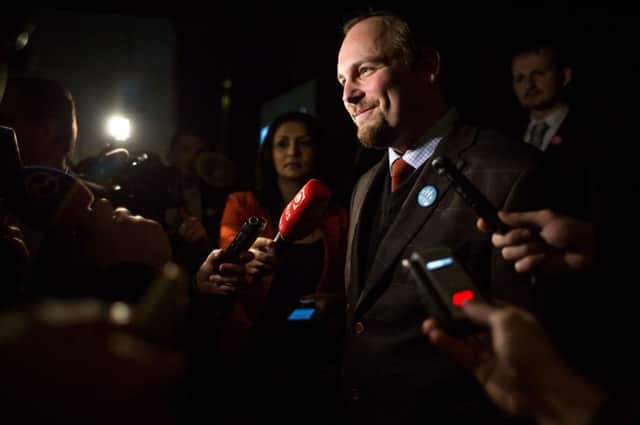Low turnout stops Slovakian anti-gay rights vote


In Saturday’s vote, Slovaks were asked whether they agree to three points: that marriage can only be called a union between a man and a woman; that same-sex partners must be barred from adopting children; and that it’s up to parents to decide whether their children receive sex education.
The vote was forced by the Alliance for Family, a social conservative group that received massive support from the Catholic Church. The group argues that the traditional family is under threat and highlighting an increasing number of countries, including neighbouring Austria and the Czech Republic, that allow various forms of same-sex unions, or child adoption by gay couples.
Advertisement
Hide AdAdvertisement
Hide AdWith all the votes tallied yesterday by the country’s Statistics Office, voters overwhelmingly voted “yes” – 95, 92 and 90 per cent, respectively – to the three questions.
But turnout reached only 21.4 per cent, far less than the 50 percent needed.
“It’s a success of Slovakia’s democracy,” said Silvia Porubanova, an analyst.
But a leader of the alliance, Anton Chromik, said he was delighted that a clear majority of the voters who participated in the ballot supported the alliance and called it “a good base” for its further activities.
“We will continue our struggle to protect the family,” he said as the low turnout became apparent.
The alliance’s Anna Veresova added: “The most important thing is that the family became the topic of the day and perhaps the topic of the year,”
Romana Schlesinger, a LGBT activist, said she hoped the government will now work to make it possible for same-sex couples to live in registered partnership “because all our partnerships, our families are living without legal recognition or protection”.
Activist Hana Fabry agreed, saying: “I am happy for the result. The referendum was about limiting the rights of a minority by the majority, so it should not have taken place at all.”
Advertisement
Hide AdAdvertisement
Hide AdPope Francis gave his blessing to a referendum. During an audience in Rome ahead of it, he said: “I greet the pilgrims from Slovakia and, through them, I wish to express my appreciation to the entire Slovak church, encouraging everyone to continue their efforts in defence of the family, the vital cell of society.”
Slovakia’s population of 5.4 million people is predominantly Catholic and is one of the most religious countries in Europe – it does not allow same-sex partners to live in registered partnerships and the country’s constitution was amended last year to define marriage as a union between a man and a woman.
The grassroots conservative movement that backed the referendum had sought to strengthen those bans through a popular vote that would have made it more difficult to change the legislation further down the line.
Despite its religiosity, statistics have show that the percentage of children born out of wedlock in Slovakia is only slightly lower than in the neighbouring Czech Republic, which is one of the least devout nations in Europe, and the number of births per woman is even lower.
The vote in Slovakia – which follows a similar one that succeeded in Croatia in 2013 – points to a cultural divide within the European Union in which more established western members are rapidly granting new rights to gays, while eastern newcomers entrench conservative attitudes toward LGBT people.